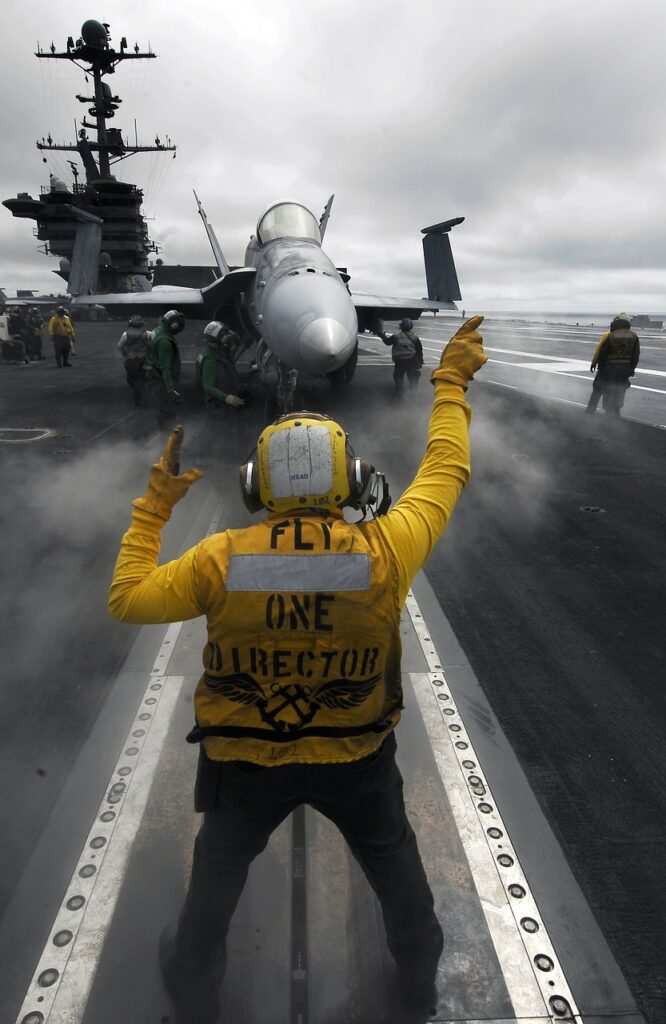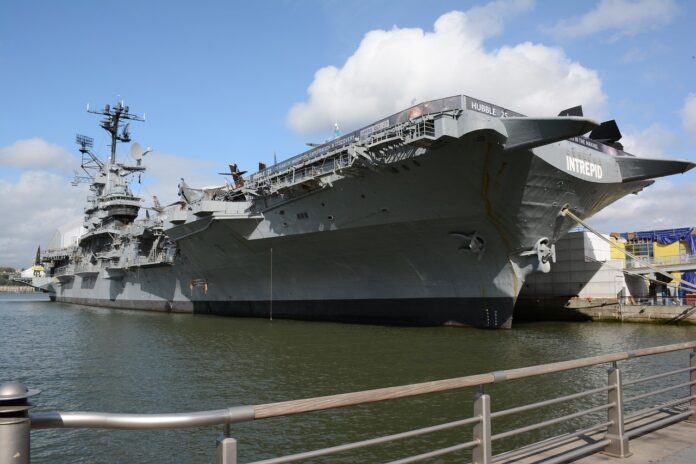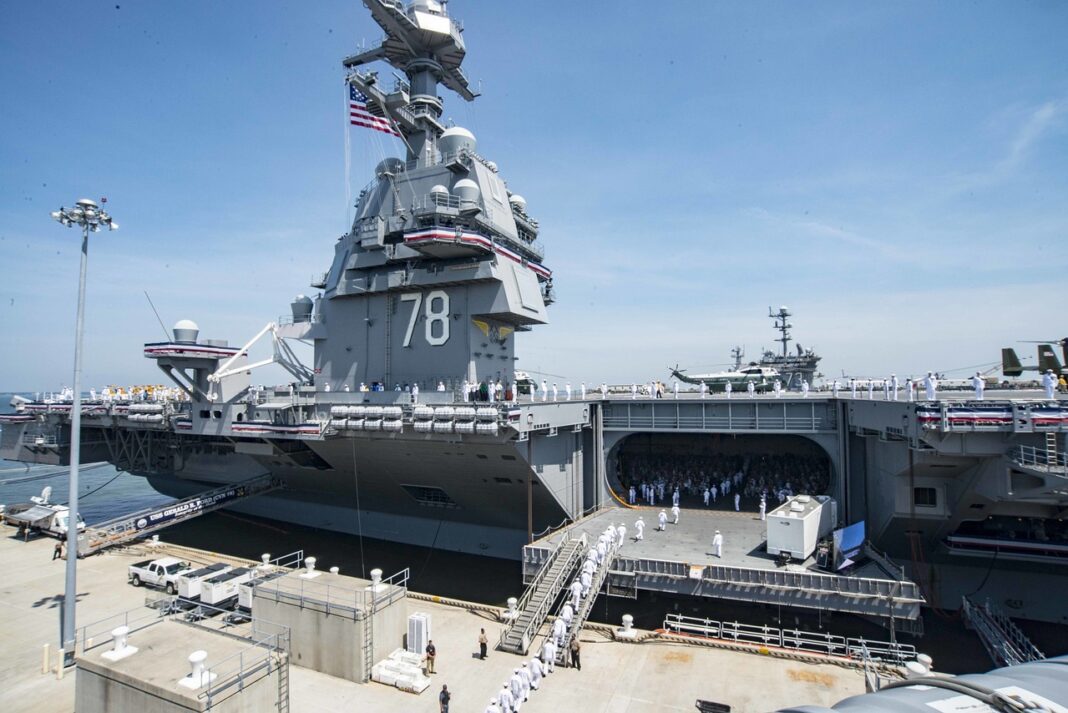By Robin Makaron
Ever since man became one with the sea, maritime expenditures and strategies have been elaborated, debated, and deployed. Its history can be traced down through the years since, with varying emphases, interpretations, and terminology.
Historically, navies and ships have commonly been the military-diplomatic instrument of choice for projecting — explicitly or implicitly — the threat of politics by other means1. The term “naval” or “gunboat” diplomacy may have a modern ring to it can be traced back to the early twentieth century.2
On October 19, 2023, the Pentagon deployed the aircraft carrier Gerald R. Ford and its battle group into the eastern Mediterranean, and with the Dwight D. Eisenhower carrier strike gently on its way.
As the advancements in techno-military industries fuel the desire for power and control, the drumbeats of a worldwide war have pounded discreetly over us since the turn of the century. Most recently, the Russian invasion of Ukraine, alongside ongoing tensions between China and the United States and the Israeli-Gaza conflict accelerated its buildup.
It begs the question, is naval diplomacy an effective non-threatening tool to deter the risk of war, or is it a remnant of imperialism whose goal is to assert dominance and order at the expense of lesser nations?
Concepts and Definitions: A false perception of diplomacy?
While viewed as an effective way to deter the risk of war in the short term, naval diplomacy is “the application of naval capabilities in pursuit of national objectives during cooperation and competition below conflict”. 3
However, some experts find the term as being too narrow, emotionally charged, and burdened by colonialism.4 While theoretical aspects of its political use point to the necessity of a clear distinction from a mere “naval presence,” which is deemed insufficient as a focal point in a theory of naval diplomacy.5
Military power plays a crucial role in diplomacy, but it’s important to recognize that there are additional dimensions of power at play. 6
The general implications of the use of military presence serve a largely symbolic role such as signaling interest and physically demonstrating support to one’s allies. It can also signal changing perspectives and changing commitments, depending on their manipulation. Its objective is to constrain the opposition’s role in a crisis which can include everything from showing the flag to establishing a false sense of security and order.
On the other hand, naval diplomacy is defined as “the use or the threat of limited naval force in order to secure advantage or to avert loss, either in the furtherance of an international dispute or else against foreign nationals within the state’s territory or jurisdiction”.7
The foregoing definition has divided acts of naval diplomacy into two specific categories: cooperative and coercive. Its main component resides in its intent to influence behavior. The lower limit of its spectrum of activity is nonthreatening in nature and the upper limit of spectrum falls short of the state of war but can include violence8.
Yet, it raises the question of when an act of influence crosses into an act of violence and whether such provocative activity can still be legitimately classified as diplomacy.
Diplomacy is distinguished from the broader idea of foreign policy in the sense that, “diplomacy involves means and mechanism” including a wide range of techniques.
Military diplomacy, on the other hand, is defined as a set of activities carried out by the representatives of the defense department, as well as other state institutions, aimed at pursuing the foreign policy interests of the state in the field of security and defense policy. 9

This involves gathering intel on the armed forces and the security situation in the receiving state, organizing working visits of representatives of the defense authorities and peaceful stay of the military units of the sending state in the receiving state, and more importantly supporting business contracts with arms and military equipment between the sending and the receiving state.
This distinction sets military diplomacy apart from related phenomena like naval or coercive diplomacy.
In the context of its nature, naval diplomacy is not – unlike military diplomacy – a form of “diplomacy” in the sense of a non-violent instrument for the pursuit of foreign policy based mainly on negotiations, but it is in fact a specific method of the use of military force – primarily as an instrument for intimidation.
The Counterproductive effect of Naval Diplomacy on neighboring countries
As Prussian King Frederick the Great once said “Diplomacy without arms is like music without instruments”.
The intersection of force and diplomacy is one of many important topics in the fields of history and international relations10. Examining their conjunctions brings academic specialties together and broadens the scope of how nations interact.
The use of “limited naval force” is inherently a political concept because the threat of force is not limited by the size or characteristics of the ships involved. Consequently, no category of actions can be labeled as a safe threshold. The acceptance of all concerned parties of an act of force as limited rather than an act of war is independent of objective, motive, or international law.11
Introducing naval forces into an already existing crisis is often viewed as highly provocative and requires a delicate approach.12 Hence the term “diplomacy” in naval diplomacy underscores the need to stabilize the conflict, supplementing the fighting connotation of naval use.
But one must question whether its presence is prepositioned or projected into the crisis.
Warships and navies represent symbols of national sovereignty and power, and for having, not only a defense value but also a symbolic and supportive value such as diplomatic envoys. A military commander quickly learns that diplomacy is not solely the province of diplomats.
This way of action can be counterproductive. Not only can it fail to produce desired political effects but can also cause unintended and unforeseen damages.
The harsh reality is that an aggressor nation, usually a more powerful or resourceful state, which uses its force of arms, produces a fait accompli and thus in the process, from the victim’s viewpoint, commits illegalities and violates its sovereignty. The victim nation is not left with an abundance of choices. It must either accept or react to the new situation.
Domestic political factors, although complex, must be considered and should not be minimized by political leaders.13 Naval diplomacy, then, must take account of a state’s political, historical, economic, and military world view the policy environment, the decision-making processes, and internal pressures that shape the parameters and likelihood of what can be achieved.14
No one can deny that detaching the military carries housing devastating air wings and sends a powerful deterrence message to any nation that seeks to disrupt the rules-based international order.
Therefore, naval diplomatic tactics must not only be an act not intended to start a war, but also one calculated not to incite a response or worse create an everlasting resentment that could potentially broaden into a regional conflict in the long term.
Neocolonialism Resentment: Naval Diplomacy in the Middle East
As explained beforehand, naval diplomacy tends to offer short-term solutions, its “last resort” nature, its simplicity, and the gap between its idealistic objectives and practical outcomes illustrate its temporary effectiveness.
In order to be durable in the long term, it must be complemented by comprehensive foreign policy strategies that address the underlying issues driving international conflicts.
The use of sea power in “achieving world domination” was already a generally accepted concept during the Cold War. Sergey Gorshkov, Admiral of the Fleet of the Soviet Union, used the term “local wars of imperialism” to encapsulate his interpretations of this Western strategy.15
By pursuing economic opportunities in the region’s oil fields, the United States challenged Britain’s position and became a dominant power in the Middle East during the 1920s. But it must be said that America’s determination to lead, combined with an incomprehension of the region, has been the principal problem in American foreign policy.
Washington’s unwavering support for Israel in its collision with its Arab neighbors seems to underline a US instinct for the solution of problems by force. Washington was and still is a vital provider of military, economic; and political aid. It bore a key responsibility for Israel’s prolonged assault during the Lebanese civil war in the 1970s, and similarly in Gaza in 2008. These expeditions did not go unnoticed as they aroused widespread condemnation.16

Most Arab countries are absolutely convinced that American foreign policy towards the Near and Middle East is Jewish foreign policy and that the American press, and a large part of the government, are very much under the dominance of Zionists. Many individuals still think that American diplomacy is not only dollar diplomacy but oil diplomacy and that United States foreign policy is dominated by one family the Rockefellers.17
A few days back, retired General Frank McKenzie emphasized that the carriers and the flying squadrons [in the Mediterranean] give the president “options”. These options demonstrate the United States’ assertive stance in the intricate and tragic Israeli-Palestinian conflict.
While the Biden administration maintains that its primary objective is to warn Hezbollah and other Iranian proxies against getting involved in the conflict, it has also conveyed back-channel messages to Qatar, indicating its seriousness about using force if necessary. Biden’s decision may inadvertently set in motion a process of escalation.
More generally, the reliance upon naval fleets reflects the pragmatic orientation of American diplomacy inadequacy upon fanatical nation-states such as Iran. And while with most Middle Eastern states, diplomatic relationships follow a pattern, the volatile dynamics of dealing with sovereign states necessitate a more strategic and nuanced approach.18
This comes at a time when the region is currently in the midst of a change, presenting unique prospects for peace and prosperity after long decades of war and insecurity. While Saudi Arabia and Iran engaged in on-off talks, with Beijing’s mediation, to ease their bitter rivalry, and reduce conflicts, the United States finds itself no longer as influential a player in the region.
About the author:
| Robin Makaron is a Lebanese citizen in Paris, holds degrees in Law and Economics and a master’s in International Law from Pantheon-Sorbonne University. He’s preparing for the French Bar exam. His father, a diplomat with a doctorate in Public Law, served in various high-ranking positions worldwide, shaping Robin’s interest in global affairs. |
Notes
1 Mandel, Robert. “The Effectiveness of Gunboat Diplomacy.” International Studies Quarterly, vol. 30, no. 1, 1986, pp. 59–76.
2 As documented by the Oxford English Dictionary.
3 Department of the Navy, Naval Doctrine Publication 1: Naval Warfare (1 April 2020): 25. 4 J. J. Widen (2011) Naval Diplomacy—A Theoretical Approach, Diplomacy & Statecraft, 22:4, 715-733 5 Richard G. Colbert, Kenneth R. McGruther Naval War College Review, Vol. 27, No. 2 (September-October 1974), pp. 3-20
6 Drab L. Defence diplomacy – an important tool for the implementation of foreign policy and security of the state. Security and Defence Quarterly. 2018;20(3):57-71. doi:10.5604/01.3001.0012.5152.
7 J. Cable, Gunboat diplomacy, 1919–1991: political applications of limited naval force (third edition), Basingstoke: Macmillan/IISS, 2016, p. 14.
8 Naval Diplomacy beneath the waves: Study of the coercive use of Submarines Shirt of War by Brent Alan Ditzler (December 1989), Thesis, Naval Postgraduate School
9 PhDr. Erik Pajtinka, Military Diplomacy and Its Present Functions, 2016
10 WEAVER, MICHAEL E. “The Relationship between Diplomacy and Military Force: An Example from the Cuban Missile Crisis.” Diplomatic History, vol. 38, no. 1, 2014, pp. 137–81. JSTOR,
11 James Cable, “Gunboat Diplomacy,” International Military and Defense Encyclopedia, vol. III, p. 1135.
12 Richard G. Colbert, Kenneth R. McGruther Naval War College Review, Vol. 27, No. 2 (September-October 1974), pp. 3-20
13 Ken Booth, Navies and Foreign Policy (London: Croom Helm; New York: Crane Russak, 1977), p. 31.
14 Edward Luttwak, The Political Uses of Sea Power, Studies in International Affairs, no. 23
(Baltimore and London: Johns Hopkins Univ. Press, 1974), pp. 6–8
15 Rowlands, Kevin (2012) “Decided Preponderance at Sea”: Naval Diplomacy in Strategic Thought,” Naval War College Review: Vol. 65: No. 4, Article 9.
16 Alexander, A. (2011) America and the Imperialism of Ignorance: US Foreign Policy Since 1945, Google Books. Biteback Publishing
17 McClintock, R. M. “THE ART OF DIPLOMACY: A Lecture Delivered at the Naval War College on 17 September 1964.” Naval War College Review, vol. 17, no. 5, 1965, pp. 56–71. JSTOR
18 Thomas M. DiBiagio, Law, Force & Diplomacy at Sea, by Ken Booth, 12 Md. J. Int’lL. 121 (1987)




